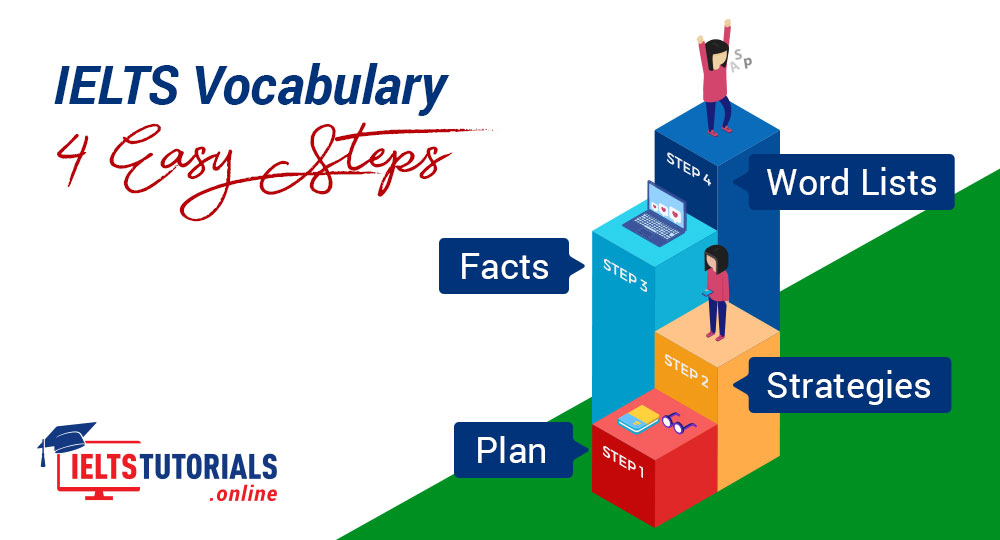
IELTS Vocabulary: 4-Step Plan, Strategies, Facts & Word Lists
Out of all the skills and techniques you show in the IELTS exam, vocabulary is definitely the most important. It contributes up to 25% in your total score of IELTS Writing and Speaking. Not only this, but Listening and Reading tests are vocabulary tests too.
Use a flexible range of vocabulary for IELTS; the examiner will definitely look for your vocabulary skills. A useful vocabulary will help you convey what you actually mean. Even in the Reading Section, you will get a text having a lot of difficult words.
Good IELTS vocabulary is particularly crucial for all those who want to achieve band 7 or higher. In short, you need to have a wide range of vocabulary to do well in the exam.
Find all the information that you need to improve your IELTS vocabulary:
- Improving IELTS Vocabulary: Methods to Avoid
- Take the First Step to Improve Your Vocabulary for IELTS
- 4-Step Plan to Improve Your Range of Vocabulary for IELTS
- Fact Related to IELTS Vocabulary, Problems and Tips
- IELTS Topic Related Vocabulary, Common Word Lists
Improving IELTS Vocabulary: Methods to Avoid
It is often observed that many IELTS aspirants use the wrong method to learn IELTS Vocabulary. Let's check out all the wrong methods:
- Memorising long list of words
- Reading the dictionary
Well, this is a fact. Doing so will not help you learn the words in a context. You will fail miserably to know how to use words accurately. It means you are not learning the words within a sentence or meaning.
It is a bad practice that is very common amongst students. The examiner will know that you have memorised the words. It will look unnatural and eventually your scores will suffer.
Take the First Step to Improve Your Vocabulary for IELTS
First of all, know your current level of vocabulary.
Take a full-length IELTS Vocabulary Test for free.
When you attempt the test, ask yourself: Can I understand all the essential information provided in the recordings and passages? Am I able to express my ideas efficiently in both Speaking and Writing sections?
Once you know your current level of vocabulary, you can start working on expanding it. As explained, don't memorise more words instead learn them in context to their meaning.
4-Step Plan to Improve Your Range of Vocabulary for IELTS
Read & Listen: Choose a TV show, podcast, magazine or a book of your interest. Don't listen to or read something that is not of your interest; it will distract you.
Focus on Words: Put a habit of jot down new words that you come across, understand their meaning and learn to apply them at proper places.
Use Memory Tricks: You should keep on reviewing the words that you have already learnt. Take a test for yourself. Know your level and work on it accordingly.
Practice and Practice: Hard work and determination can only help you to improve IELTS Vocabulary.
Fact Related to IELTS Vocabulary
Did you know that human mind can only effectively remember around 15 new words in a foreign language per day?
The more you learn; the more you will create problems for yourself.
PROBLEMS:
- Learning additional words will consume your crucial time.
- You will be more prone to make mistakes if you don't have a proper understanding of collocation.
TIP
Learn only 15 words a day. 15 words might sound low to you, but if you learn every day, after a month, you will have nearly 450 words in your notebook.
Vocabulary is not just about learning new words; rather it is essential to understand their meaning. Improve the use of collocations to utilize them that appropriate place.
For example, let's consider
"I had a quick meal" - Correct use of collocation
"I had a fast meal" - Incorrect use of collocation
Undoubtedly, the meaning of both words is the same. Yet 'fast' does not pair up with the word 'meal' in the mentioned example. In such a situation, a proper understanding of collocation comes into role.
IELTS Topic-related Vocabulary
Know more about a few common topics and important vocabulary for IELTS that regularly appears in the IELTS test.
Note: These are not definitive lists or a complete set of words and topics
Continue your IELTS Vocabulary practice with the tips. Work on all the mentioned strategies shared in this article and improve the level of your vocabulary range.
For more practice, sign up on IELTS Tutorials and benefit from 20+ Free Practice Tests.
You could also join IELTS regular classes to get help from tutors. They are efficient and highly experienced in IELTS. Visit IELTS Tutorials to know more.
